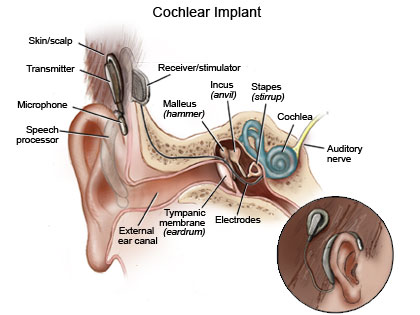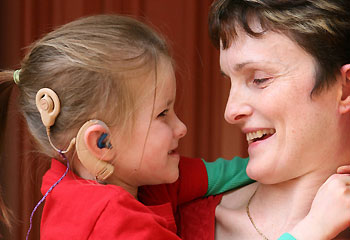Cochlear Implants: What to Expect During Surgery
Cochlear implants are not a cure for hearing loss, but they can provide an opportunity to perceive sound. Research has shown that if parents are going to have their children undergo cochlear implant surgery, it’s best to do it sooner rather than later. Doing so can greatly improve the child’s speech and language development so that they are on target with their peer groups. While every surgery is serious and should not be considered lightly, it may reassure you to know that cochlear implant surgery has become routine. It may even be performed on an outpatient basis.
Preparing for the Surgery
Expect to meet with the anesthesiologist, the audiologist, and the surgeon prior to the procedure. Expect your child to undergo a thorough evaluation. Disclose his complete medical history, and tell the surgeon if he takes any medications or has any allergies.
If your child is older, it might reassure him to take a tour of the hospital beforehand and meet with his surgeon. Explain that the doctor will use a special medicine so that he will take a nap and that he will not feel pain. Remind him that he can return home very soon after the procedure. And remember to be honest with him while using age-appropriate terms; keeping your promises is important. If your child is still nervous, it might help to use pretend play and a prop like a teddy bear or a doll to demonstrate. Point to the doll’s ear and tell your child that the doctor will put a special device in there so that she can hear.
Cochlear Implant Surgery
Your child will be placed under general anesthesia. The entire procedure will typically no longer than two to three hours. Some hair may need to be shaved from the area. After sterilizing the skin, the surgeon will make an incision behind the ear. The surgeon will drill into the bone to create a “pocket” for the receiver. The surgeon will then drill through the mastoid bone to create access to the cochlea. He will insert the electrode array into the cochlea, and then close the incision with stitches.
Recovering from Surgery
After the surgery, your child will be taken to a recovery room until the effects of the anesthesia have worn off. When he wakes up, he might feel dizzy, pressure or discomfort in the ear, nauseous, or disoriented. He might have a sore throat from the breathing tube used during the operation.
It is likely that your child can return home the same day. Otherwise, he might need to stay overnight for observation. The doctor will provide a prescription for pain medicine, and he might also prescribe antibiotics as a preventative measure. A dressing might be placed over the ear, which may usually be removed the next day. The sutures will not need to be removed; they will naturally dissolve over time.
Your child’s surgeon will provide specific instructions as to when he may resume eating normally and engaging in physical activity. Most children are able to resume eating at the rate with which they are comfortable. Expect a follow-up appointment no later than two weeks after the surgery. It may take three to six weeks for the ear to fully heal. Your child will not have the external transmitter until the ear is healed, so he will be unable to use the cochlear implant right away.
Possible Risks of Cochlear Implant Surgery
Cochlear implant surgery is considered to be generally safe. However, you should know about all of the possible risks before your child has the operation. Infection, skin breakdown over the implanted device, wound healing problems, and complications from the anesthesia are possible. Less commonly, nerve damage, leakage of cerebrospinal fluid, meningitis, vertigo, abnormal taste, and failure of the device have also occurred.





